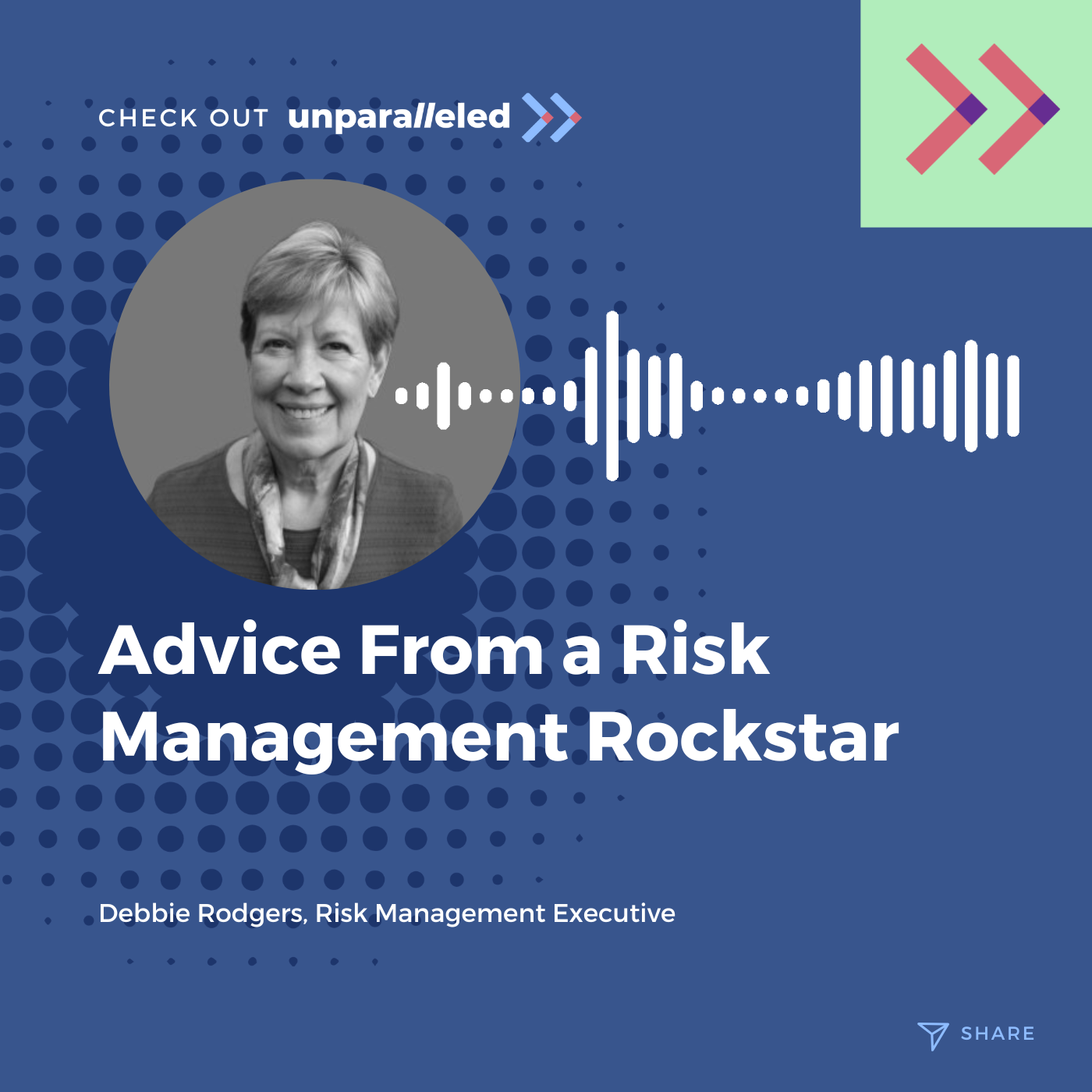Mastering Strategic Risk Management
Unparalleled Episode 003: Debbie Rodgers “Risk Manager of the Year”
Strategic risk management boosts career success through skills, data, and relationships. In our third episode of Unparalleled, we are extremely lucky to have Debbie Rodgers join us!
The risk management industry doesn’t have a Hall of Fame, but Debbie would undoubtedly be in it if it did. Debbie is pretty much a risk management rockstar.
In 2010, she was named “Risk Manager of the Year” by Business Insurance. And in 2019, she won the Harry and Dorothy Goodell Award for lifetime achievement in risk management.
Strategic Risk Management Key Strategies for Success with Debbie Rodgers
In today’s episode, Debbie joins us to share tips for people new to taking on risk-related roles and advice on how risk managers can expand their impact. She is the perfect person for this topic as someone who has been celebrated for her risk management experience and expertise.
1. Risk Professionals Cannot Succeed Without Intellectual Curiosity
Debbie kicked off the episode by sharing the ingredients that make someone a good risk professional. She strongly believes that a large piece of it is whether or not a person has intellectual curiosity.
Debbie even goes as far as saying that risk professionals can’t be successful if they don’t have intellectual curiosity, no matter how much training they have.
The reason why she’s such a big believer in intellectual curiosity is that risk professionals need to be asking a lot of questions, including questions about the bigger picture and implications.
Risk professionals can’t assume they always know the answers. Instead, they need to delve deeper in order to get the full picture and genuinely understand the risks that are impacting them.
“A big piece of it is intellectual curiosity. You need to ask a lot of questions as a risk manager, and if you don't have that basic intellectual curiosity, you're never going to succeed.”- Debbie Rodgers
2. Emotional Intelligence (EQ) is Just as Important as IQ
At its core, risk management is a “people business,” which is why Debbie thinks that EQ is an equally important piece of the puzzle as IQ.
Risk professionals need to be emotionally aware and understand how to gauge and talk to their audiences.
Debbie cited her ability to ask the right questions and engage people as a contributing factor to her success in risk management — something that wouldn’t be possible if Debbie didn’t possess a high level of emotional intelligence.
3. Risk Management is a Customer Service Business
On top of being a “people business,” risk management is also a customer service business.
Whenever Debbie brought new people onto her team, the first thing she’d tell them is that it’s a customer service business. She would tell them that in their roles, they’ll have a lot of customers.
Their job was to work with those customers to help them achieve their goals. Risk professionals have support roles in organizations that they work in.
They need to be good listeners and find the smartest course of action to empower others in their organizations to do their jobs.
4. The Importance of Building the Respect of the Business Owners
Building the respect of the business owners and other important stakeholders is key to accomplishing one’s goals in risk management.
By having the respect of these individuals, risk professionals can leverage their trust to get the necessary buy-in for their risk initiatives. Risk professionals can build their respect with business owners by being good listeners.
They have to truly tune in to what the business needs and goals are. Only then can they help the business find solutions to the problems they face.
“The business has to do what the business has to do. For risk professionals, the success lies in helping them get there with a little bit of thought toward how this might have a bigger implication.” - Laurie Solomon
5. Being Intentional About Who to Connect With
For those who are new to taking on risk-related roles, it’s imperative that they find people they can connect with and learn from.
Debbie is a proponent of being intentional about connecting with people. If risk professionals see someone at their company or in their field that they have an appreciation for the way they work, they need to learn from that person.
Finding people they can learn from can have a long-lasting impact on their careers.
6. Risk Managers Can’t Do Their Jobs Without Meaningful Data
Debbie was an early adopter of using data to guide her risk management initiatives.
When Debbie joined Aramak in 2003, she was tasked with decreasing the cost of insurance in a hard market period. One of the major cost drivers at Aramak at that time was workplace injuries.
Debbie immediately went to work and hired someone with an analytical background to come in and help them understand what was driving the cost of workplace injuries.
She worked with this person to build a system and pull all the data from the injuries. From the data, they were able to conclude that slips, trips, and falls were the primary risks.
From their conclusion, the team at Aramak was able to find ways to reduce these risks, such as by purchasing slip-resistant shoes, which in turn, substantially reduce the cost of risk to the organization and the related insurance cost.
Debbie wouldn’t have been able to pull this off if she didn’t have the necessary data.
The need for data is even more critical in today’s world. Risk professionals need accessible and accurate data to empower them to do their best work.
7. The Ability to Communicate About Risks
Most people don’t understand risk management, which is why being able to communicate about risks is essential for today’s risk professionals.
An exercise that everyone on Debbie’s team had to do was write a one-minute elevator pitch highlighting what they do in the risk department.
If anyone ever asks a member of her team what they do, her team members can easily recite their elevator pitch in a way that will make them memorable and stand out.
Some tips for communicating about risks are to know the audience and be quick, concise, and charismatic.
Debbie Rodgers’s rich experience gives her a lot of wisdom and insight into the field of risk management.
New risk professionals must develop soft skills, such as fostering intellectual curiosity, cultivating emotional intelligence, and developing listening and problem-solving abilities.
It’s also crucial that the risk professionals of today and the future need to prioritize building relationships and utilizing data in their risk management practices.
Risk professionals can only succeed if they possess these fundamental qualities.

 />
/>



